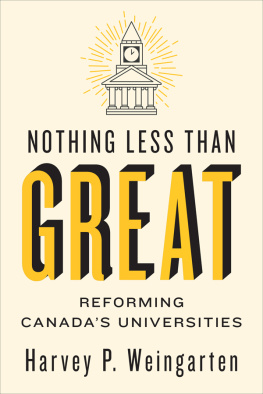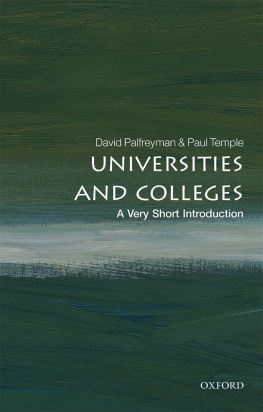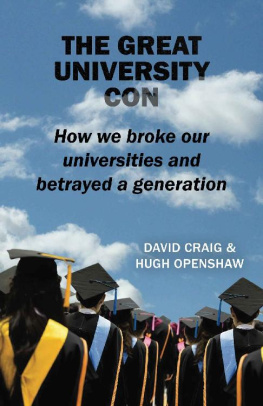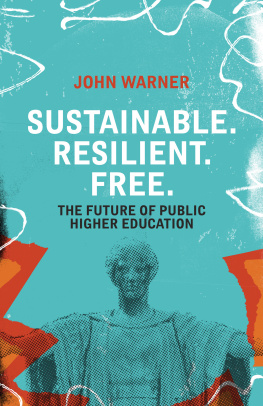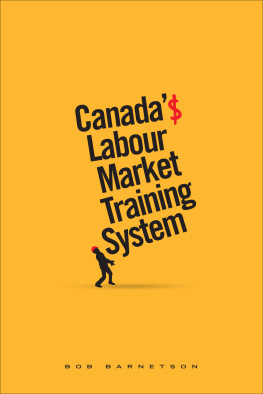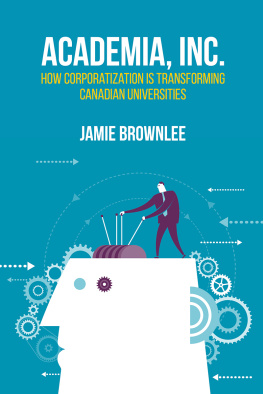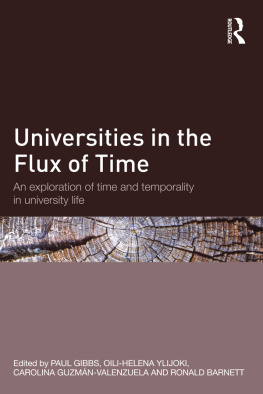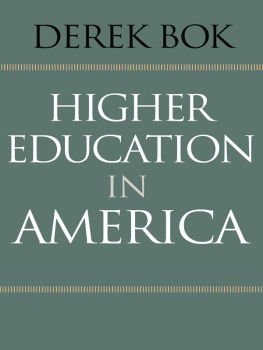Canadas public higher education system is in trouble. The economic and social benefits of the Canadian university system are widely seen as a public good, which raises a pressing question: Why should we aspire to anything less than a great system? For that to happen, everything about the way universities currently operate, from the boardroom to the classroom, must change but this kind of operational and public policy transformation will not be easy.
Exploring how universities might and should change to reclaim their central purpose for Canadians, Nothing Less than Great will be of interest to anyone who cares about the future of our country and the important role universities play in determining that future.
HARVEY P. WEINGARTEN is Principal of the School of Applied Health Sciences at the Michener Institute of Education at UHN and a senior fellow at the C.D. Howe Institute. He was formerly vice president (academic) and provost at McMaster University, president and vice chancellor at the University of Calgary, and president and CEO of the Higher Education Quality Council of Ontario.
UTP Insights is an innovative collection of brief books offering accessible introductions to the ideas that shape our world. Each volume in the series focuses on a contemporary issue, offering a fresh perspective anchored in scholarship. Spanning a broad range of disciplines in the social sciences and humanities, the books in the UTP Insights series contribute to public discourse and debate and provide a valuable resource for instructors and students.
For a list of the books published in this series, see .
NOTHING LESS THAN GREAT
Reforming Canadas Universities
Harvey P. Weingarten
UNIVERSITY OF TORONTO PRESS
Toronto Buffalo London
University of Toronto Press 2021
Toronto Buffalo London
utorontopress.com
Printed in the U.S.A.
ISBN 978-1-4875-0943-9 (cloth) ISBN 978-1-4875-0946-0 (EPUB)
ISBN 978-1-4875-0944-6 (paper) ISBN 978-1-4875-0945-3 (PDF)
Library and Archives Canada Cataloguing in Publication
Title: Nothing less than great : reforming Canadas universities / Harvey P. Weingarten.
Names: Weingarten, Harvey P., 1952 author.
Series: UTP insights.
Description: Series statement: UTP insights | Includes bibliographical references and index.
Identifiers: Canadiana (print) 20210158174 | Canadiana (ebook) 20210158271 | ISBN 9781487509439 (cloth) | ISBN 9781487509446 (paper) | ISBN 9781487509460 (EPUB) | ISBN 9781487509453 (PDF)
Subjects: LCSH: Education, Higher Canada. | LCSH: Universities and colleges Canada. | LCSH: Educational change Canada.
Classification: LCC LA417.5 .W386 2021 | DDC 378.71 dc23
University of Toronto Press acknowledges the financial assistance to its publishing program of the Canada Council for the Arts and the Ontario Arts Council, an agency of the Government of Ontario.

For my beloved Barbara, who makes all good things in my life possible,
and
Sarah and Laura, who fill my life with joy and pride
Woodrow Wilson was president of Princeton University from 1902 to 1910. During his tenure he engaged the faculty repeatedly, enthusiastically, and doggedly in an attempt to modernize and reform the curriculum. He had his successes. The current president of Princeton, Christopher Eisgruber, wrote in a recent article that Wilson transformed the place from a sleepy college to a world-class research university. Wilson summarized his frustrations about change in universities as follows:
Changing a university curriculum is like moving a graveyard. You dont know how many friends the dead have until you try to move them.
This book examines the current state of the graveyard and how it might be moved.
Contents
I have been fortunate throughout my life to have known a host of individuals, teachers, and mentors who shaped my behaviour and thinking, influenced my life and career choices, supported me, and were instrumental in whatever successes I have enjoyed. I cannot acknowledge or thank them enough, but I will try.
Mr. Highland, my high school biology teacher, who was the first to expose me to the beauty of biological systems, a fascination that has stayed with me throughout my life.
Norman White, my undergraduate mentor at McGill University, who introduced me to the elegance of studying brain-behaviour relationships and who imparted many life lessons that stay with me to today.
Terry Powley, my PhD supervisor at Yale University, a rigorous, first-class scientist who drilled into his students the importance and significance of numbers, data, and evidence, and that good science meant pursuing solutions to problems regardless of where the problem took you.
It took me a long time to appreciate how fortunate I was to land my first academic job in the Psychology Department at McMaster University. The department provided a supportive and nurturant environment populated by outstanding behavioural scientists and wonderful colleagues particularly Ron Racine, Shep Siegel, Jeff Galef, and the late Lorraine Allan who also modelled how to be exemplary department and university citizens.
When I began my excursion into serious academic administration at McMaster University, I learned from a talented and dedicated group of colleagues, including Mamdouh Shoukri (later president of York University), Daniel Woolf (later president of Queens University), the late Russell Joffe (later dean at Rutgers New Jersey Medical School), Alan Harrison (later provost and vice-president academic at Carleton University, University of Calgary, and Queens University), Peter Sutherland (who later in a number of acting senior leadership roles shepherded McMaster through tough transitions), and Fred music Hall. They were thoughtful, reflective, devoted to the academy, committed to high-level scholarship, and a lot of fun, particularly at the annual 24 December memo burning ceremony (thanks to the fireplace in the provosts office).
At Calgary, three wise board chairs the late Ted Newall, Brian MacNeill, and the late Jack Perraton provided unwavering support and advice. They were a source of wise counsel about organizational change, the university, the city of Calgary, and Alberta, but only when asked. I hope I did not give them too much grief. My time at Calgary overlapped with Indira Samarasekeras presidency at the University of Alberta. Although we were heads of competing institutions, we worked collaboratively and colluded to overcome the traditional Calgary-Edmonton dynamic. She was a wonderful colleague and leader smart, compassionate, and supportive. I also benefited tremendously from the counsel and humour of other presidential colleagues, especially David Naylor of the University of Toronto and Stephen Toope of the University of British Columbia. Roman Cooney, he of the gruff exterior but heart of gold, in his many years as vice-president (external) gave me a master class on communications and government relations. I was lucky to work once again with a provost, Alan Harrison, who knows more about running a university in Canada than anyone I know. Several giants in the Calgary community, especially Dick Haskayne and the late Jim Palmer, were exemplary community leaders and strong advocates for and supporters of higher education, who offered friendship, advice, support, and encouragement.

